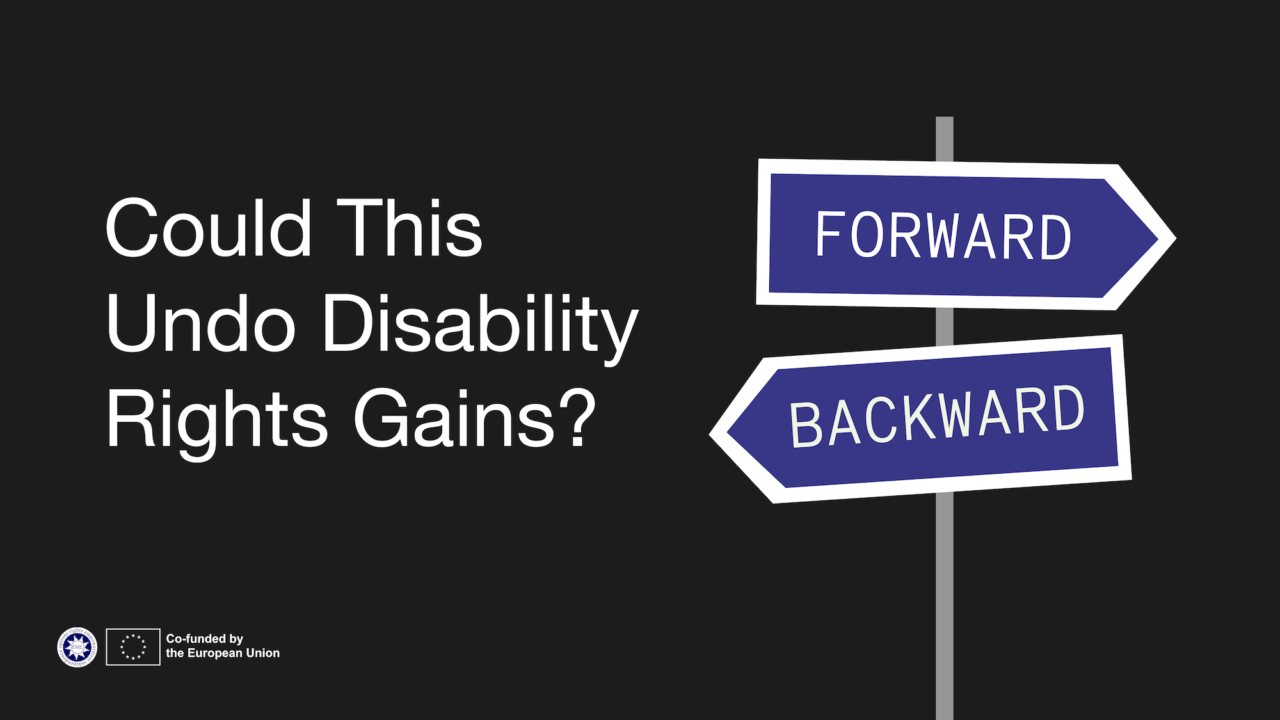The EU is working on legislation that would reverse progress achieved. ENIL is mobilising advocacy resources to contain the threat.
Every disabled person, no matter the impairment, has the right to full legal-capacity. Article 12 of the United Nations Convention on the Rights of Persons with Disabilities grants you this right. Nobody should decide for you, what you do with your property, which contracts you enter into or where you live.
In the past, it was believed that people with intellectual, neurodivergent or psychiatric impairments are unable to take those decisions for themselves, that they need a “normal” person to do that for them. These people were called guardians or curators. This model is still widespread. The UN CRPD and General Comment No. 1 state, in polite terms, that these ideas are nonsense. Everyone is able to take their own decisions. The adoption of the UN CRPD brought legal improvements, in some countries at least.
To date, 13 EU-member states have restricted the possibility to deprive somoene of their legal capacity, while 6 countries have largely abolished the various forms of guardianship.[1]
What if someone feels they need some help in taking decisions about their property? In these situations supported-decision making provides the answer. In supported-decision making people you trust explain the effects of decisions to you but the legal responsibility is not taken from you.
Personal freedom and Supported-decision making under threat
In 2023 the European Commission proposed a regulation that threatens to turn back the clocks. The regulation on the protection of vulnerable adults, aims to implement the 2000 HCCH Hague Convention “On the International Protection of Adults” throughout the EU. The objective of the Convention and the directive is to “to provide for the protection in international situations of adults who, by reason of an impairment or insufficiency of their personal faculties, are not in a position to protect their interests.“
If someone is placed under guardianship in one country and is moved to another country, authorities are to automatically recognise the guardianship arrangenemts. If a person is placed in an institution in another country or moved between institutions, authorities are to recognise this too, quick and efficiently.
To facilitate recognition, EU countries are to introduce central registers, containing all people deprived of their legal capacity and the nature of the guardianship regimes they are under, not just those who find themselves in a cross-border situation.
It is self-evident that the Hague Convention and the European Commission draft regulation, are going against the rights of disabled citizens to take their own decisions. There is no doubt, that both legal documents are against the UN CRPD.
This has been confirmed by the renowned law scholar Prof. Theresia Degener and the UN Special Rapporteur on the Rights of Persons with Disabilities. The European Commission received a letter from the Committee on the Rights of Persons with Disabilities, warning against going ahead with the regulation.
The Hague Convention was adopted in 2000, six years before the Convention. It is not understandable why the European Commission is undertaking considerbale efforts now, to implement a Convention whose legal principles were superseded by the UN CRPD.
ENIL’s advocacy campaign
Already last year, ENIL started to work against the proposal advanced by the Commission. This year we are reinforcing our advocacy work. We have adopted a revised position paper and amendments which are being distributed among Members of the European Parliament (MEPs) and national governments. During the next week several meetings with decision-makers will take place, to convince them of the need to amend the proposed regulation.
Which changes are we fighting for in particular?
Central registers
For the most parts, the regulation and the Convention are procedural. The purpose is to coordinate existing legal practices, not to create new ones. However, article 45 of the regulation on the protection of adults introduces central registers. The idea is to have every EU government to introduce such a register and to make them enter all people deprived of their legal capacity into it, including the key details of the regime. The regulation wants the registers to be interconnected, so authorities across the EU can access them easily.
Given the design of the regulation, the purpose of the registers is not to support people but to make it easier for authorities to deprive them of their legal capacity. If a person under guardianship or obligation to be in an institution would move to another country, to escape government control, authorities there could find out easily.
The registers are the only manifest element stemming from the regulation. It’s a new rule every country would have to introduce because of the regulation. Thus, ENIL´s main objective is to have the central registers removed. Authorities have all the information they need to provide support already. A privacy crackdown is not justifiable.
Placements in institutions
Article 21 of the regulation intends to ensure that placements in institutions are automatically recognized across borders. Unfortunately, removing this article from the legal document would not help. In this case article 33 of the Hague Convention, which has the same content, would apply directly. It is possible though to adjust article 21 to the legal context of the EU. This legal context has been shaped by the UN CRPD which in combination with General Comment No 5 states that institutionalization is not valid form of disability support. Instead of recognizing institutionalization, authorities should recognize person-centered support arrangements, especially personal assistance. If they don´t have personal assistance, they should introduce it.
ENIL is proposing an amendment to article 21 which would disarm the article by removing the institutional threat.
Supported decision-making
Articles 1, 2 and 3 of the regulation outline the different measures authorities can take to deprive people of their legal capacity and how those should be automatically recognized.
ENIL is proposing amendments that would replace the various types of depriving people of their legal capacity by supported-decision making. In the supported decision-making concept we apply, we follow the work of the Norwegian Personal Assistance Cooperative Uloba which has done ground-breaking work in this field.
The Hague Convention
The best way to stop these efforts of coordination is to change the Hague Convention itself. There is a mechanism to do that.
What can you do
If this topic is upsetting you and you wish to do more than sharing social media posts, you can contact MEPs from the Committee on Juridical Affairs or the missions of your governments to the EU.
Short, informal e-mails, explaining what you are writing about, what you don´t agree with and what you would like decision-makers to do differently are perfectly sufficient.
You should focus in particular on contacting MEP Jana TOOM who is the rapporteur for the file.
Contacting the shadow-rapporteurs is very important too:
https://www.europarl.europa.eu/meps/en/257045/MICHAL_WAWRYKIEWICZ/home
https://www.europarl.europa.eu/meps/en/257085/KRZYSZTOF_SMISZEK/home
https://www.europarl.europa.eu/meps/en/197795/MARIO_FURORE/home
It is also helpful to contact any member of the EP Committee on legal affairs:
https://www.europarl.europa.eu/committees/en/juri/home/members
You can download the full position paper in word format here and in pdf format here
You can download the full amendments in word format here and in pdf format here
[1] https://www.edf-feph.org/publications/human-rights-report-2024-legal-capacity/



